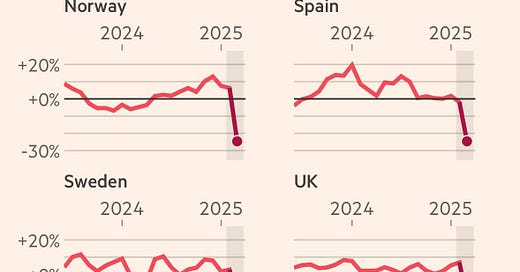France, Denmark, Germany, and Ireland Join Canada in Urging Travelers to Use Burner Phones at U.S. Borders Amid Digital Surveillance and Detention Fears
European Nations Join Canada in Advising Travelers to Use Burner Phones at U.S. Borders
Friday, April 18, 2025
In a major escalation of travel advisories, five Western democracies—France, Denmark, Germany, Ireland, and Canada—have jointly warned their citizens to adopt digital security protocols when crossing into the United States, including the use of burner phones and data hygiene practices.
The move comes amid mounting reports that U.S. Customs and Border Protection (CBP) agents are conducting device searches without warrants, inspecting private content such as emails, text messages, and social media activity. Several travelers have allegedly been detained, denied entry, or flagged for further scrutiny based on information retrieved from their personal electronics.
This coordinated shift in diplomatic posture marks a historic turning point. For the first time, longstanding U.S. allies are urging travelers to treat the United States as a high-risk surveillance jurisdiction, a designation previously reserved for countries like China or Russia.
Why Are These Countries Taking Action?
Investigations into border screening practices have revealed an expanding pattern of unregulated device searches. CBP agents can demand passwords, clone data, and interrogate travelers about their digital lives, even if no probable cause exists. While courts have yet to impose strict limits, the erosion of due process at the border is prompting foreign governments to take preemptive action.
Travelers from these five countries have reported being questioned over:
Political opinions expressed online
Messaging app content
Participation in protests
Social media connections
The practice has been linked to increased detentions and visa revocations for students, journalists, and tech professionals.
Canada Leads, Europe Responds
Canada was the first to update its advisory earlier this month. Effective April 11, Canadian citizens staying in the U.S. for over 30 days must now register their stay and are advised to travel with temporary or encrypted devices.
Now, France, Denmark, Germany, and Ireland have followed suit. Each nation’s foreign ministry has issued digital safety guidance explicitly recommending burner phones, cautioning against the use of personal email or cloud services while in the United States.
EU Deploys Burner Tech for Diplomats
The European Union itself is adopting these protocols. Officials traveling to the U.S. must now use sanitized hardware—a practice typically limited to visits to adversarial states. The European Commission’s internal policy bars diplomats from bringing personal devices and mandates encrypted communications only.
This is the first known instance of such security measures being applied to an allied nation.
The Human Toll and Legal Concerns
The implications are deeply personal. Several students have already sued DHS for visa revocations allegedly based on digital surveillance, including:
A Dartmouth Ph.D. student whose stipend was revoked after his SEVIS status was mysteriously terminated.
A University of Wisconsin student whose SEVIS record was deleted following a dismissed disorderly conduct arrest.
Attorneys like Jonathan Wasden, a former ICE litigator, warn that “every procedural safeguard in the book was blown past.” Students, activists, and journalists have been disproportionately affected.
Civil liberties groups are calling for oversight. The ACLU and Canadian Civil Liberties Association have demanded transparency, regulation, and due process standards for digital searches at ports of entry.
What Travelers Should Do
If you’re entering the U.S. from Canada or Europe, officials recommend:
Using burner phones or temporary laptops with limited data
Wiping all devices before crossing
Avoiding use of personal accounts on U.S. soil
Logging out of email, cloud storage, and messaging apps
Preparing for additional screening if flagged by CBP
Digital privacy is now considered a core component of international travel safety.
A New Paradigm for Cross-Border Travel
The shift is profound. The U.S.—long a symbol of openness and innovation—is now viewed by its allies as a country where digital rights may be compromised at the border. As surveillance expands and trust erodes, governments are quietly transforming their approach to travel—replacing convenience with caution, and trust with encryption.
What was once considered paranoia is now protocol.
Tourism Numbers Drop as Perceptions Shift
The economic fallout is already visible. According to federal data, overseas travel to the U.S. declined 5% in February 2025, the first full month of Trump’s second term. Some of the steepest declines came from Asia—24% from China and 20% from South Korea—and Western Europe, including Germany, Switzerland, and Belgium. Even Canadians, who typically don’t need visas, are visiting less.
The U.S. Travel Association estimates that a 10% reduction in Canadian tourism alone could cost the U.S. $2.1 billion in lost spending and 14,000 jobs. Travel forecasting firm Tourism Economics projects a 9% overall drop in international visits this year, blaming Trump’s escalating trade wars and diplomatic frictions.
The message is resonating: travelers no longer see the U.S. as safe or worth the hassle.





